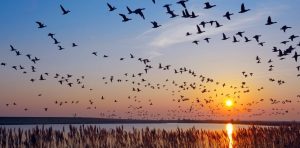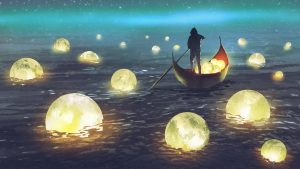 The Columbia City Yoga on-line Moving into Meditation class met this morning. We reflected on what it means to have “wise hope” in these challenging times of global strife and environmental decline. We practiced being with what is true. We considered our willingness to bring caring actions to the world despite the uncertainty of success. Each of us can bring our light to this “beautiful broken world.”
The Columbia City Yoga on-line Moving into Meditation class met this morning. We reflected on what it means to have “wise hope” in these challenging times of global strife and environmental decline. We practiced being with what is true. We considered our willingness to bring caring actions to the world despite the uncertainty of success. Each of us can bring our light to this “beautiful broken world.”
We heard readings from Valerie Brown’s book Hope Leans Forward: Braving Your Way Toward Simplicity, Awakening and Peace. Valerie is a practitioner and teacher in the lineage of Zen Master Thich Nhat Hanh. Valerie’s teachings and writings encourage students to make life affirming choices in conditions of challenge and uncertainty. These choices help us to align our actions with the values that enliven meaning and purpose. Today we touched on what it is to have “wise hope” for the future of our world.
We heard a few lines of affirmation from Andjelka Jankovic Andjelka is a seeker and writer of stories, travel guides and life perspectives. She is inspired by living questions like: What does it mean to flourish?
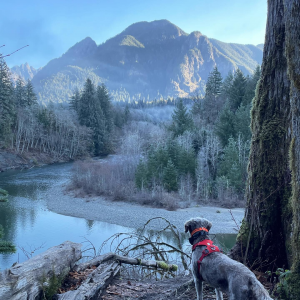 We heard David Wagoner’s poem, Lost. David was a poet of the Pacific Northwest who died in 2021 at the age of 95. He was a conservationist and a hiker. He experienced awe in our Northwest lands and also lamented humanity’s treatment of nature. David taught at the University of Washington for many years. He once said: “Those who do without poetry should imagine their lives without music — they are missing that much by missing poetry.”
We heard David Wagoner’s poem, Lost. David was a poet of the Pacific Northwest who died in 2021 at the age of 95. He was a conservationist and a hiker. He experienced awe in our Northwest lands and also lamented humanity’s treatment of nature. David taught at the University of Washington for many years. He once said: “Those who do without poetry should imagine their lives without music — they are missing that much by missing poetry.”
Guided Reflection
Welcome. Last week we heard the story of the Quechua people. We learned about their traditional life-ways that have enabled them to depend on glaciers for their water. Now their glaciers are rapidly melting and the meltwaters and rivers are poisoned. We reflected on our inter-dependence and how the choices we make locally affect others globally.
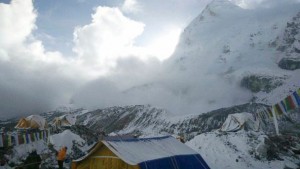 We can never know the full consequences of our actions. History is full of small acts that have changed the world in surprising ways. My dear friend and teacher, Laura, reminded me that before the Chinese occupation of Tibet, the Tibetan culture was very insular. Very few people were ever permitted to travel there. The Chinese invasion had, and continues to have, tragic consequences to the Tibetan people. And, these events brought the Dalai Lama and other Tibetan spiritual teachers out into the world. Their shared teachings and social activism have changed the world. I can’t imagine the many lives that have been touched, the many people who have received what they need to lead flourishing lives.
We can never know the full consequences of our actions. History is full of small acts that have changed the world in surprising ways. My dear friend and teacher, Laura, reminded me that before the Chinese occupation of Tibet, the Tibetan culture was very insular. Very few people were ever permitted to travel there. The Chinese invasion had, and continues to have, tragic consequences to the Tibetan people. And, these events brought the Dalai Lama and other Tibetan spiritual teachers out into the world. Their shared teachings and social activism have changed the world. I can’t imagine the many lives that have been touched, the many people who have received what they need to lead flourishing lives.
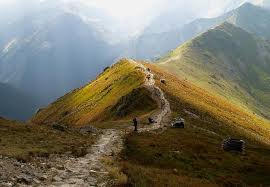 This makes me hopeful, which is what I would like us to reflect on today. We are facing so many challenges around the world: the destructive affects of climate change, the roughly 120 armed conflicts around the world, the rise of autocracy that challenges democracy and may threaten the human rights we have worked hard to establish for many years. So it feels like we are navigating dark, perilous times. And, I want to live with hope for a better future.
This makes me hopeful, which is what I would like us to reflect on today. We are facing so many challenges around the world: the destructive affects of climate change, the roughly 120 armed conflicts around the world, the rise of autocracy that challenges democracy and may threaten the human rights we have worked hard to establish for many years. So it feels like we are navigating dark, perilous times. And, I want to live with hope for a better future.
In her book, Hope Leans Forward, meditation teacher and writer Valerie Brown draws her inspiration from Roshi Joan Halifax who speaks of wise hope.
Wise hope requires that we open ourselves to what we do not know, what we cannot know; that we open ourselves to being surprised, perpetually surprised. . . . wise hope appears through the spaciousness of radical uncertainty, of surprise and this is the space in which we can engage.
I love this message because I really need to hear it. I want to create this kind of spaciousness in my life. I want to create space to hear and see people who don’t think like I do. I want to learn about them. I want to understand them. I want to connect with them.
It is in not knowing that “hope comes alive.” It’s in our capacity to see things as they are and to believe that our actions matter even if we don’t know, can’t know, the outcome. We are guided by what we care about, what matters most to us, and what we can do to support healing within ourselves and in our beautiful and broken world.
This is a call to our caring hearts. We bring life to our practice when we can see things as they are. We hold innumerable possibilities open when we know our actions matter without assurances of success. Valerie affirms our inter-dependence when she says:
What happens to me affects you; what happens to you affects me. With this, I realize I am not alone.
We begin with mindfulness. In mindfulness we might discern: what is true. We might discover: what is waiting within. We might listen: to our hearts and the hearts of others. We might recognize: where we are being called. We might let there be space for what what Andjelka Jankovic names:
Sacred, small, everyday moments.
Overwhelmed with kindness.
The silent divinity of wild places.
Unexpected friendships.
Whatever leads to ease.
Poet David Wagoner writes:
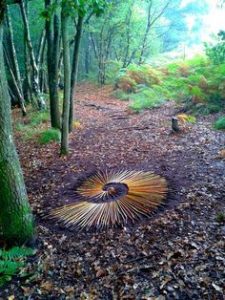 You are surely lost. Stand still. The forest knows where you are. You must let it find you.
You are surely lost. Stand still. The forest knows where you are. You must let it find you.
Stand still. The trees ahead and bushes beside you
Are not lost. Wherever you are is called Here,
And you must treat it as a powerful stranger,
Must ask permission to know it and be known.
The forest breathes. Listen. It answers,
I have made this place around you.
If you leave it, you may come back again, saying Here.
No two trees are the same to Raven.
No two branches are the same to Wren.
If what a tree or a bush does is lost on you,
You are surely lost. Stand still. The forest knows
Where you are. You must let it find you.
Mindful presence brings us to life, to each other, to the world around us. We are not lost. We are in this place, together, called Here. Let’s start our practice by taking a few deep breaths. You might roll your shoulders and move your neck or shift your body from side to side, forward and back. I invite you to consciously give yourself time, space and the permission to be.
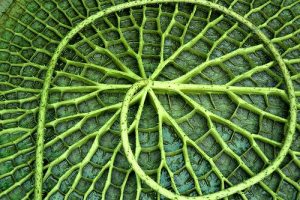 Sense your body. Notice those places where you feel Earth’s support. I invite you to explore relaxation. Notice your face: the areas around of your brow and eyes, jaw and lips. And what about relaxing your neck, your shoulders, arms and hands? Even as you let the breath be easy, just as it is; can you also sense the strong muscles and bones of your back holding you up? What is it like to be relaxed and awake?
Sense your body. Notice those places where you feel Earth’s support. I invite you to explore relaxation. Notice your face: the areas around of your brow and eyes, jaw and lips. And what about relaxing your neck, your shoulders, arms and hands? Even as you let the breath be easy, just as it is; can you also sense the strong muscles and bones of your back holding you up? What is it like to be relaxed and awake?
I invite you to tune into the sensations of breathing. Notice where and how you feel the breath. Can you let it come to you as you breathe in and let it go as you breathe out, effortless and intimate. Can you let your whole body be receptive?
And you are Here, ready to notice mind wandering, doing what mind does. Can you welcome this moment of awakening, knowing that you’re back? Mindfulness returned. Awareness present.
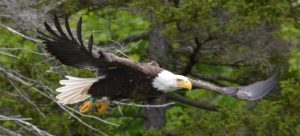 What is like to be alive and aware? Make the magic of beginning again. There may be curiosity and openness. How will the next breath feel? Breathing in. Breathing out. Meet breath just as it is. Life just as it is. We meet mysteries big and small every one of our days. Each moment is a new beginning. Each moment holds seeds of possibility when we’re willing to let go and begin again. What do you need to release – like the out-breath – in order to live?
What is like to be alive and aware? Make the magic of beginning again. There may be curiosity and openness. How will the next breath feel? Breathing in. Breathing out. Meet breath just as it is. Life just as it is. We meet mysteries big and small every one of our days. Each moment is a new beginning. Each moment holds seeds of possibility when we’re willing to let go and begin again. What do you need to release – like the out-breath – in order to live?
Meeting ourselves in mindfulness we ready ourselves to meet an other person with presence. We don’t know how the meeting will unfold or how this being will reveal themselves. We might truly sense this person: a being with their own hopes, fears, dreams, desires, joys and sorrows. We might experience the tender vulnerability that we all share.
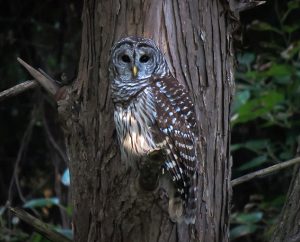 Perhaps the more we become aware of ourselves – the more we become aware of the world around us. Philosopher Martin Buber wrote that all real living is meeting. We reach across the unknown in relating to one another. We open our hearts and minds. We may even be willing to be changed by what we see and hear. To be fully present with the people we love is a gift. We see them and allow ourselves to be seen. In mindful, heartfelt presence, we come together, we join our imaginations in empathy and caring. And, perhaps, this is where hope lies.
Perhaps the more we become aware of ourselves – the more we become aware of the world around us. Philosopher Martin Buber wrote that all real living is meeting. We reach across the unknown in relating to one another. We open our hearts and minds. We may even be willing to be changed by what we see and hear. To be fully present with the people we love is a gift. We see them and allow ourselves to be seen. In mindful, heartfelt presence, we come together, we join our imaginations in empathy and caring. And, perhaps, this is where hope lies.
And if this seems too much to ask of ourselves in these troubled times we can rest in presence. Here, we rest and remember to remember. Each moment is a new beginning. Each moment contains possibility when we’re willing to let go and begin again.

